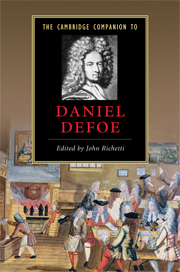Book contents
- Frontmatter
- Introduction
- 1 Defoe: the man in the works
- 2 Defoe’s political and religious journalism
- 3 Defoe, commerce, and empire
- 4 Defoe and criminal fiction
- 5 Money and character in Defoe’s fiction
- 6 Defoe’s Tour and the identity of Britain
- 7 Defoe as narrative innovator
- 8 Gender and fiction in Moll Flanders and Roxana
- 9 Defoe and London
- 10 Robinson Crusoe: varieties of fictional experience
- 11 Defoe: satirist and moralist
- 12 Defoe and poetic tradition
- Further Reading
- Index
10 - Robinson Crusoe: varieties of fictional experience
Published online by Cambridge University Press: 28 March 2009
- Frontmatter
- Introduction
- 1 Defoe: the man in the works
- 2 Defoe’s political and religious journalism
- 3 Defoe, commerce, and empire
- 4 Defoe and criminal fiction
- 5 Money and character in Defoe’s fiction
- 6 Defoe’s Tour and the identity of Britain
- 7 Defoe as narrative innovator
- 8 Gender and fiction in Moll Flanders and Roxana
- 9 Defoe and London
- 10 Robinson Crusoe: varieties of fictional experience
- 11 Defoe: satirist and moralist
- 12 Defoe and poetic tradition
- Further Reading
- Index
Summary
The story of the castaway merchant-adventurer, Robinson Crusoe, is among the most widely recognized in world literature, and even those who have never read the book seem to know something of what is in it. The island isolato belongs to the culture as an archetype - a man cast away on a deserted island - and all the speculation attached to that scene constitutes a kind of fictional parlor game. How would any man or woman react? What tools and materials would one want? What books would one wish to bring? What kind of company would prove most desirable, if company were to arrive at some time? How would one pass the hours, days, months? How would one dispose space? As Elizabeth Bishop remarked in her wonderful poem “Crusoe in England,” Crusoe's “brain breeds islands.” The island is a supplement to Crusoe's (or anyone's, for that matter) imagination. Bishop puts it this way: “... But my poor old island's still / un-rediscovered, un-renamable. / None of the books has ever got it right.” I have titled this essay “Varieties of Fictional Experience,” because in the three hundred years since Defoe published The Life and Strange Surprizing Adventures of Robinson Crusoe the most fertile reader of the Crusoe story is Robinson Crusoe himself.
- Type
- Chapter
- Information
- The Cambridge Companion to Daniel Defoe , pp. 182 - 199Publisher: Cambridge University PressPrint publication year: 2009
- 3
- Cited by

